To Build A Fire
Department Literary Lode

At twelve o’clock the day was at is brightest. Yet the sun was too far south on its winter journey to clear the horizon.
The bulge of the earth intervened between it and Henderson Creek, where the man walked under a clear sky at noon and cast no shadow. At half-past twelve, to the minute, he arrived at the forks of the creek. He was pleased at the speed he had made. If he kept it up, he would certainly be with the boys by six. He unbuttoned his jacket and shirt and drew forth his lunch. The action consumed no more than a quarter of a minute, yet in that brief moment the numbness laid hold of the exposed fingers. He did not put the mitten on, but, instead, struck the fingers a dozen sharp smashes against his leg. Then he sat down on a snow-covered log to eat. The sting that followed upon the striking of his fingers against his leg ceased so quickly that he was startled. He had no chance to take a bite of biscuit. He stuck the fingers repeatedly and returned them to the mitten, baring the other hand for the purpose of eating. He tried to take a mouthful, but the ice muzzle prevented. He had forgotten to build a fire and thaw out. He chuckled at this foolishness, and as he chucked he noted the numbness creeping into the exposed fingers. Also, he noted that the stinging which had first come to his toes when he sat down was already passing away. He wondered whether the toes were warm or numb. He moved them inside the moccasins and decided that they were numb.

He pulled the mitten on hurriedly and stood up. He was a bit frightened. He stamped up and down until the stinging returned into the feet. It certainly was cold, was his thought. That man from Sulphur Creek had spoken the truth when telling how cold it sometimes got. And he had laughed at him at the time! That showed one must not be too sure of things. There was no mistake about it, it was cold…. He got out matches and proceeded to make a fire. From the undergrowth, where high water of the previous spring had lodged a supply of seasoned twigs, he got his firewood. Working carefully from a small beginning, he soon had a roaring fire, over which he thawed the ice from his face and in the protection of which he ate his biscuits. For the moment the cold of space was outwitted. The dog took satisfaction in the fire, stretching out close enough for warmth and far enough away to escape being singed.

When the man finished, he filled his pipe and took his comfortable time over a smoke. Then he pulled on his mittens, settled the ear flaps of his cap firmly about his ears, and took the creek trail up the left fork. The dog was disappointed and yearned back toward the fire. This man did not know cold. Possibly all the generations of his ancestry had been ignorant of cold, of real cold, but the dog knew; all its ancestry knew, and it had inherited the knowledge. And it knew that it was not good to walk abroad in such fearful cold. It was the time to lie snug in a hole in the snow and wait for a curtain of cloud to be drawn across the face of outer space whence this cold came…But the man whistled, and spoke to it with the sound of whip lashes, and the dog swung in at the man’s heels and followed after.
And then it happened. At a place where there were no signs, where the soft, unbroken snow seemed to advertise solidity beneath, the man broke through. It was not deep. He wet himself halfway to the knees before he floundered out to the firm crust.

He was angry, and cursed his luck aloud. He had hoped to get into camp with the boys at six o’clock, and this would delay him an hour, for he would have to build a fire and dry out his footgear. He turned aside to the bank which he had just climbed. On top, tangled in the underbrush about the trunks of several small spruce trees, was a high-water deposit of dry firewood—sticks and twigs, principally, but also larger portions of seasoned branches and fine, dry, last year’s grasses. He threw down several large pieces on top of the snow. This served for a foundation and prevented the young flame from drowning itself in the snow it otherwise would help. The flame he got by touching a match to a small shred of birch bark that he took from his pocket. This burned even more readily than paper. Placing it on the foundation, he fed the young flame with wisps of dry grass and with the tiniest dry twigs.
He worked slowly and carefully, keenly aware of his danger. Gradually, as the flame grew stronger, he increased the size of the twigs with which he fed it… He knew there must be no failure…Already the sensation had gone out of his feet. To build the fire he had been forced to remove his mittens, and the fingers had quickly gone numb. His pace of four miles an hour had kept his heart pumping blood to the surface of his body and to all the extremities. But the instant he stopped, the action of the pump eased down…

But he was safe…There was the fire, snapping and crackling and promising life with every dancing flame. He started to untie his moccasins. They were coated with ice; the thick German socks were like sheaths of iron half way to the knees; and the moccasin strings were like rods of steel all twisted and knotted as by some conflagration.
But before he could cut the strings, it happened. It was his own fault, or, rather, his mistake. He should not have built the fire under the spruce tree. He should have built it in the open…Each time he had pulled a twig he had communicated a slight agitation to the tree—an imperceptible agitation, so far as he was concerned, but an agitation sufficient to bring about the disaster. High up in the tree one bough capsized its load of snow. This fell on the boughs beneath, capsizing them. The process continued. It grew like an avalanche, and it descended without warning upon the man and the fire, and the fire was blotted out! Where it had burned was a mantle of fresh and disordered snow.
The man was shocked...
[Ed. Note: This classic story deserves to be read in its entirety.]
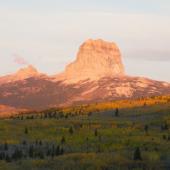
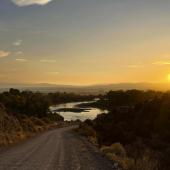
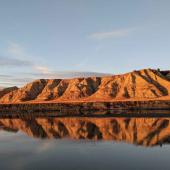
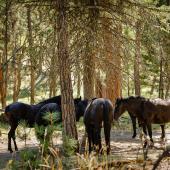
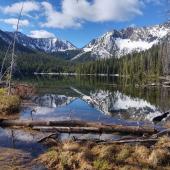
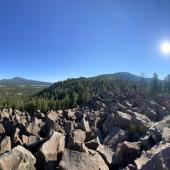
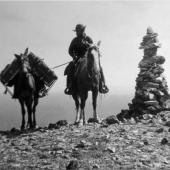
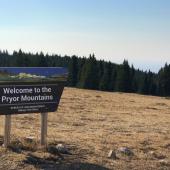
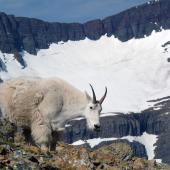
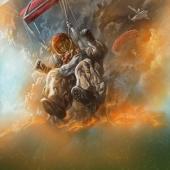


Leave a Comment Here